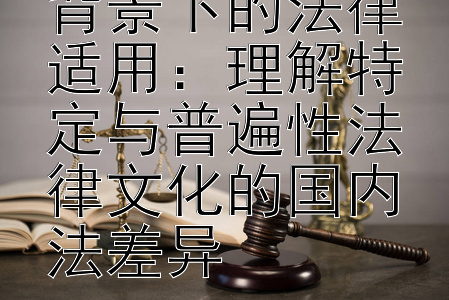在现代法治国家中,法律责任是法律体系中的一个重要概念,它是指行为人由于违反法律规定或者基于法律的特别规定而应当承担的某种不利的后果。根据责任主体的范围和性质的不同,法律责任可以分为特定法律责任(specific liability)和普遍性法律责任(general liability)两大类。本文旨在探讨这两者在国内外法律实践中的异同点以及它们在国内法中的具体体现。
一、特定法律责任的概念及特点
特定法律责任通常指因个别的、特定的违法行为或不当行为所引起的法律责任。其主要特点包括: 1. 主体特定:这种责任是由具体的个人、组织或法人等实体所承担的; 2. 针对性强:特定法律责任是为了纠正或补偿某一特定行为的损害而设立的; 3. 可预见性较低:相较于普遍性法律责任,特定法律责任往往更难以事先预测和防范。
二、普遍性法律责任的概述及其优势
普遍性法律责任则是指那些由一般性的法律规定所产生的,对所有符合一定条件的主体都可能适用的法律责任。它的优点在于: 1. 平等适用:无论个人的身份地位如何,只要违反了相应的法律法规,就可能承担同样的责任; 2. 预防效果好:由于普遍适用,因此具有较强的威慑力和教育作用,有助于社会成员自觉遵守法律; 3. 操作便捷:因为适用于广泛的行为群体,所以在执行时相对简便易行。
三、国内外法律实践中两者的差异
(一)立法层面
在立法过程中,各国可能会根据本国的实际情况和社会价值观来设定不同类型的法律责任。例如,在一些强调个体自由的国家,如美国,可能会更加注重保护个人的权利和自由,因此在某些领域可能会有较多的特定法律责任设计;而在另一些追求集体利益的国家,如中国,则可能在环境保护等领域更多地采用普遍性法律责任以实现对社会整体利益的维护。
(二)司法实践
在司法实践中,法官在面对不同的案件时,也会根据案件的性质和具体情况来判断应适用何种类型的法律责任。比如,在中国,对于环境污染这类涉及公共利益的问题,法院往往会采取严格的法律解释,使得大多数企业都负有较高的环保义务,从而体现了普遍性法律责任的特征。而对于一些轻微的个人侵权行为,则可能会考虑减轻被告的赔偿责任,这又体现了特定法律责任的灵活性。
四、相关案例分析
Case One: Environmental Pollution in China (中国的环境污染案)
- Background: A company in China was found to have been discharging pollutants into a local river without proper treatment, leading to severe water contamination and negative impacts on the community's health and livelihood.
- Legal Analysis: Under Chinese environmental laws, such as the Environmental Protection Law of the People's Republic of China, all enterprises are required to comply with strict pollution control standards. The court is likely to hold this company accountable for its actions, imposing heavy fines and possibly even shutting down the operation if necessary, to protect public interests. This reflects the application of general liabilities where the law aims at preventing harm to society rather than targeting specific individuals or entities.
Case Two: Personal Injury in the United States (美国的个人伤害案)
- Context: An individual in the U.S. sues another person for personal injuries sustained during an automobile accident that occurred due to the other driver's negligence.
- Law Application: American tort law often involves balancing fault and damages, which can lead to more nuanced determinations of responsibility. The judge might consider factors like comparative negligence or contributory negligence when deciding whether the defendant should be held liable and how much they should compensate the plaintiff. Here, we see the use of specific liabilities, where each case is evaluated individually based on its own set of circumstances.
五、结论
综上所述,特定法律责任和普遍性法律责任在国际国内的法域都有各自独特的应用场景和价值。尽管两者存在一定的区别,但它们都是确保法律公正实施的重要手段,共同构成了完整的社会治理框架的一部分。随着全球化的深入和国际交流的频繁,我们可以预期未来在这两个领域的互动会更加紧密,为构建和谐稳定的国际秩序提供坚实的法律基础。




